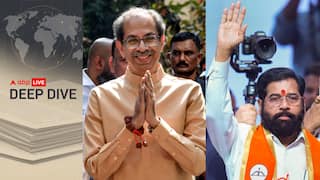Rajya Sabha Election 2022: What Is At Stake? How Are MPs Elected?
Rajya Sabha Election 2022: Out of the 57 seats, 41 candidates have already been elected unopposed. Here is how Rajya Sabha members are elected and how the polls will affect strength of parties.

The bienniel Rajya Sabha elections are slated to be held on Friday (June 10), with a close contest expected in Haryana, Rajasthan, Maharashtra, and Karnataka. Out of the 57 seats up for election, 41 candidates have already been elected unopposed in Uttar Pradesh, Tamil Nadu, Bihar, Andhra Pradesh, Madhya Pradesh, Odisha, Chhattisgarh, Punjab, Telangana, Jharkhand and Uttarakhand.
On Friday, elections will be held for 16 seats of Haryana, Rajasthan, Maharashtra and Karnataka as the number of candidates exceeds the seats going to polls.
Here Is An Explainer On The Rajya Sabha Polls:
How Are The Parties Stacked Up Currently In Rajya Sabha?
Rajya Sabha has 245 seats. Of the 245 members, 12 are nominated by the President and 233 are representatives of the states and Union territories of Delhi and Puducherry.
Currently, the BJP-led NDA holds the highest number of seats at 95 followed by the Congress at 29. The Trinamool Congress (TMC) has 13 seats, DMK 10 and BJD and AAP have eight each.
In April, the BJP-led NDA had reached the 100 mark, a figure no ruling party had touched since 1988, but its strength is down to 95 now after the terms of five of its MPs ended.
How Can The Rajya Sabha Election Affect Strength Of Parties?
Of the 57 seats that became vacant, the BJP held 24 of them. Congress held nine seats, four by the Samajwadi Party, three each by the BJD, DMK and AIADMK, two each by RJD and BSP, and one each by the Shiv Sena, Janata Dal (United), SAD, TRS, YSR Congress Party, NCP and an independent MP.
Of the 24 seats BJP held, it is likely to retain only 20 seats, bringing its current total of 95 members down to 91. BJP has already won 14 seats unopposed, and has the strength to win six of the 16 seats that will go to vote on Friday.
For the Congress, four of its candidates have been elected unopposed. The party is guaranteed to win four more. So, its strength will go up to 28. Congress can win two more seats but will require the support of other parties.
However, the biggest gainer in this round of election has been AAP. Its strength has gone up from 3 to 10 because of the thumping win in the Punjab assembly polls.
Which States Will See A Contest?
Haryana, Rajasthan, Maharashtra and Karnataka will see a contest as parties have fielded more nominees than their legislative strength in the state assemblies.
Haryana, which has two vacancies, will see elections due to the entry of a third candidate, media baron Kartikeya Sharma, an independent. He has the backing of BJP-JJP combine, most of the Independents, and Gopal Kanda, lone MLA of the Haryana Lokhit Party, PTI reported. The BJP has fielded former minister Krishan Lal Panwar, while Ajay Maken is the Congress nominee.
After more than two decades, Maharashtra will witness a contest in the Rajya Sabha polls. Union minister Piyush Goyal, Anil Bonde, Dhananjay Mahadik (BJP), Praful Patel (NCP), Sanjay Raut and Sanjay Pawar (Shiv Sena) and Imran Pratapgarhi (Congress) are in fray for the six seats. The contest is for the sixth seat - between BJP's Mahadik and Sena's Pawar.
In Rajasthan, which has four vacancies, the contest has spiced up with the entry of a fifth candidate, Subhash Chandra, the founder of Zee and the head of Essel Group. He has the support of the BJP.
In Karnataka, the ruling BJP, main opposition Congress and the JD(S) have put up candidates for the fourth seat, forcing an election. Based on its strength in the Legislative Assembly, the BJP can win two seats and the Congress one.
How Are Rajya Sabha MPs Elected?
Rajya Sabha MPs are elected by MLAs through an indirect election and they have a six-year term. A third of Rajya Sabha MPs from each state retire every two years.
The members are chosen by the elected members of state Assemblies through a system of proportional representation by means of a single transferable vote. This means that electors can vote for any number of candidates in order of their preference.
The MLAs rank the candidates in order of preference and the candidate chosen by most of the members as their first choice is elected to the house.
However, the number of first preference votes required for a single MP varies in each state based on the size of the Assembly and the number of seats for which polls are taking place.





























